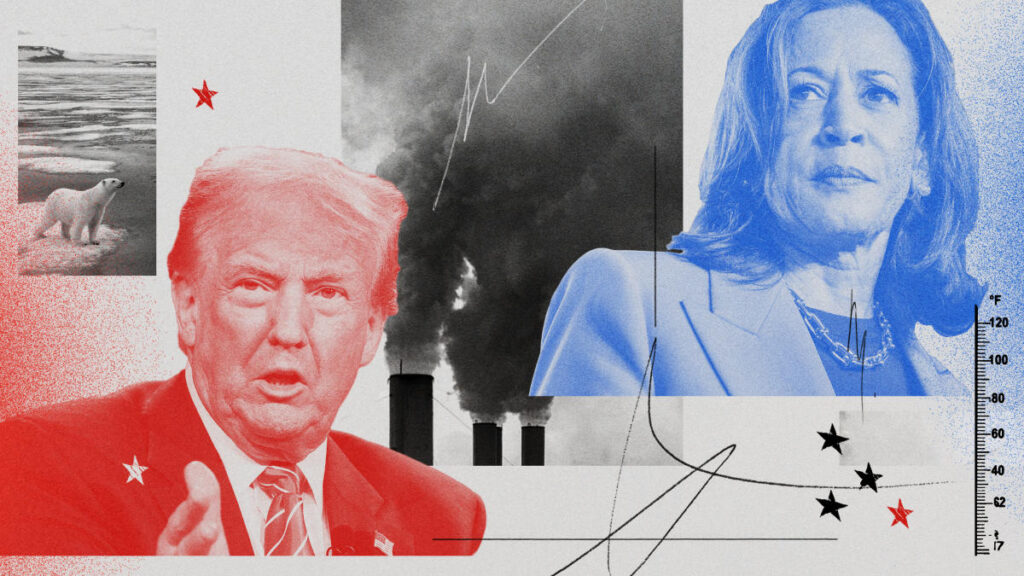The conversation surrounding climate change has intensified as the 2024 presidential election approaches, revealing a polarized landscape among candidates and voters alike. In 2023, President Biden’s administration implemented significant legislation aimed at hastening the U.S.’s transition from fossil fuels, intending to address rising global temperatures. Amidst these changes, the presidential candidates’ stances on climate change reveal contrasting philosophies and strategies. Former President Donald Trump and Vice President Kamala Harris reflect a broad ideological divide on the issue, substantially influencing voter sentiment. An Associated Press/NORC Center for Public Affairs Research poll indicated that while a majority of voters recognize climate change (78%)—and a significant portion acknowledges human activity as a contributing factor (54%)—the political debate remains sharply divided.
Scientific consensus on climate change is unwavering, with experts emphasizing an urgent need for structural changes to avert catastrophic outcomes. The United Nations’ Intergovernmental Panel on Climate Change has articulated that failure to reduce greenhouse gas emissions will lead to increasingly severe climate-related hazards, including extreme weather patterns that threaten human health and ecosystems. With the Southern U.S. experiencing accelerated sea level rise and intensified natural disasters, the repercussions of climate inaction loom large en route to the election. Despite the gravity of the situation, political affiliations heavily influence public opinion. According to the Associated Press/NORC poll, 71% of Democrats expressed support for reducing emissions, while only 27% of Republicans shared this sentiment, highlighting the partisan nature of climate policy discussions.
Former President Trump has long been a skeptic of climate change, dismissing it as a “hoax” and advocating for deregulation in favor of fossil fuel production. His tenure in office saw significant rollbacks of environmental protections, including the U.S. withdrawal from the Paris Agreement and dismantling Obama-era regulations aimed at reducing climate emissions. Trump’s position directly correlates with his economic platform, prioritizing oil and gas production while labeling environmental regulations as detrimental to business. His rhetoric misrepresents scientific data on sea-level rise and climate impacts, undermining urgent calls for systemic change.
In contrast, Vice President Harris has positioned herself as a proponent of climate action, underscoring the economic implications of climate change and the need for robust policies to address this existential threat. Under her influence, the Inflation Reduction Act emerged as a landmark piece of legislation aimed at facilitating a transition to clean energy, introducing incentives for solar power and electric transportation. Harris’s support for large-scale climate initiatives, including the Green New Deal proposed during her Senate term, indicates her commitment to mobilizing resources and public support toward climate action, though some critiques arise regarding her inconsistent stance on fossil fuel extraction methods like fracking.
Looking forward, both candidates outline differing paths regarding climate policy. Trump envisions a future dominated by fossil fuel exploration, pledging to revoke existing climate regulations and reduce federal oversight of environmental protection as part of his energy strategy. Reports suggest that Trump has solicited support from the oil and gas industry for his campaign, promising to dismantle Biden-era regulations in exchange for financial backing. His proposed approach appears focused on a short-term economic boost through increased fossil fuel production, neglecting longer-term climate impacts.
Conversely, Harris emphasizes unity in addressing the climate crisis, although details of her strategic plans remain somewhat vague. She continues to endorse the tax incentives from the Inflation Reduction Act as central to achieving clean energy goals, while simultaneously adapting her stance on fracking. As the 2024 election nears, the candidates’ disparate views on climate change will significantly influence their campaigns and voter decisions, underscoring the need for informed engagement on environmental issues among the electorate. Harris’s assertion of climate change as a crucial matter for national policy contrasts starkly with Trump’s dismissal of environmental regulations, highlighting a critical choice for voters as they evaluate the path forward for the United States in combating evolving climate challenges.

